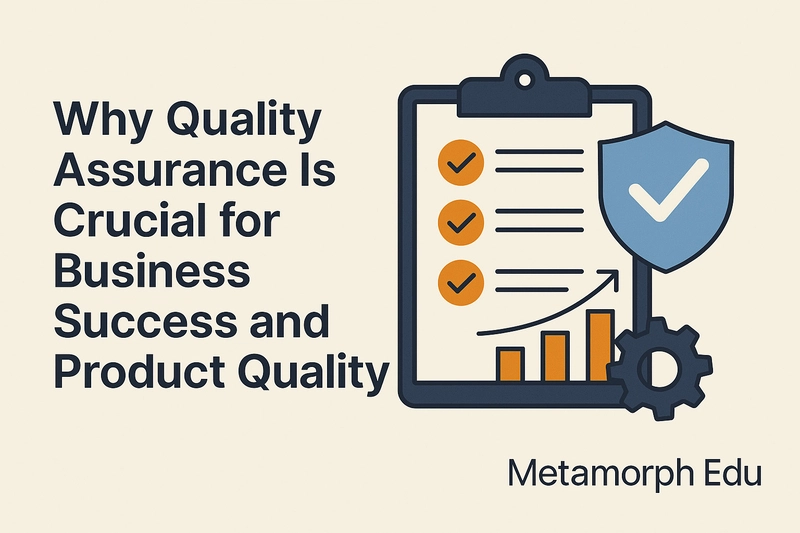Why Quality Assurance Is Crucial for Business Success and Product Quality
In today’s fast-paced and competitive marketplace, businesses must maintain high standards to meet customer expectations and stand out from their competitors. One of the most crucial elements in ensuring that a product meets these standards is Quality Assurance (QA). QA is the process of verifying and validating that products, services, or processes meet the required standards and are free from defects. Whether you’re in manufacturing, software development, or any other industry, the role of QA cannot be overstated. The Importance of Quality Assurance Quality Assurance is vital because it directly impacts both customer satisfaction and business profitability. A well-implemented QA process ensures that your product or service meets the desired specifications, is reliable, and performs as expected. By preventing defects and identifying issues early in the production cycle, QA allows businesses to avoid costly mistakes, product recalls, and damaged reputations. When businesses fail to prioritize QA, they run the risk of releasing subpar products into the market, leading to dissatisfied customers, poor reviews, and financial losses. In the long term, this can harm a company’s reputation and make it difficult to recover customer trust. Conversely, organizations that invest in robust QA systems have a competitive edge, as they deliver consistent and high-quality products that foster customer loyalty. Enhancing Customer Satisfaction In an age where customers have access to vast amounts of information through reviews and social media, delivering high-quality products is crucial to maintaining a positive brand image. A single negative experience with a defective product can quickly spread across platforms, damaging a company’s reputation. On the other hand, high-quality products result in satisfied customers, positive reviews, and increased brand loyalty. By implementing effective QA strategies, businesses can reduce the likelihood of delivering defective products to consumers. This leads to fewer returns, fewer customer complaints, and an overall better customer experience. Additionally, customers who have positive experiences with a brand are more likely to recommend it to others, further fueling business growth. Cost Reduction and Increased Profitability Many businesses mistakenly view Quality Assurance as an added cost rather than a valuable investment. However, effective QA can actually save companies money in the long run. By identifying and fixing issues early in the production process, businesses can avoid expensive recalls, rework, and customer service costs. Addressing defects after a product has been released to the market is far more costly than ensuring it meets quality standards beforehand. Furthermore, QA helps improve operational efficiency by streamlining processes, reducing waste, and minimizing errors. With fewer defects, businesses can lower operational costs and increase profitability, leading to sustainable growth. QA as a Tool for Continuous Improvement Quality Assurance is not a one-time task but rather an ongoing process. As customer expectations evolve, businesses must continually assess and improve their products and services. By incorporating QA into their daily operations, companies can build a culture of continuous improvement. Through regular testing, feedback loops, and performance metrics, businesses can identify trends, learn from their mistakes, and refine their processes. This cycle of improvement allows organizations to stay ahead of industry trends, deliver innovative solutions, and meet the ever-changing needs of their customers. How Quality Assurance Impacts Different Industries Quality Assurance is essential in every industry, but its application may vary based on the specific requirements of the sector. Below are some examples of how QA impacts different industries: 1. Software Development In software development, QA is crucial for identifying bugs, performance issues, and security vulnerabilities. A well-tested software application ensures a smooth user experience, meets customer requirements, and is free from errors. QA testers use a variety of tools to simulate real-world usage and ensure that the software functions as intended before it reaches the end user. 2. Manufacturing In manufacturing, quality assurance ensures that products meet safety standards, are free from defects, and are durable. QA processes help manufacturers identify issues in the production line early, minimizing waste, improving efficiency, and ensuring that the final product is of the highest quality. 3. Healthcare In the healthcare industry, QA plays a critical role in ensuring patient safety. From medical devices to pharmaceuticals, the products must meet strict regulatory standards to ensure they are safe and effective. QA processes in healthcare involve rigorous testing and documentation to guarantee compliance with laws and regulations. 4. Food and Beverage Food safety is a key conc

In today’s fast-paced and competitive marketplace, businesses must maintain high standards to meet customer expectations and stand out from their competitors. One of the most crucial elements in ensuring that a product meets these standards is Quality Assurance (QA). QA is the process of verifying and validating that products, services, or processes meet the required standards and are free from defects. Whether you’re in manufacturing, software development, or any other industry, the role of QA cannot be overstated.

The Importance of Quality Assurance
Quality Assurance is vital because it directly impacts both customer satisfaction and business profitability. A well-implemented QA process ensures that your product or service meets the desired specifications, is reliable, and performs as expected. By preventing defects and identifying issues early in the production cycle, QA allows businesses to avoid costly mistakes, product recalls, and damaged reputations.
When businesses fail to prioritize QA, they run the risk of releasing subpar products into the market, leading to dissatisfied customers, poor reviews, and financial losses. In the long term, this can harm a company’s reputation and make it difficult to recover customer trust. Conversely, organizations that invest in robust QA systems have a competitive edge, as they deliver consistent and high-quality products that foster customer loyalty.
Enhancing Customer Satisfaction
In an age where customers have access to vast amounts of information through reviews and social media, delivering high-quality products is crucial to maintaining a positive brand image. A single negative experience with a defective product can quickly spread across platforms, damaging a company’s reputation. On the other hand, high-quality products result in satisfied customers, positive reviews, and increased brand loyalty.
By implementing effective QA strategies, businesses can reduce the likelihood of delivering defective products to consumers. This leads to fewer returns, fewer customer complaints, and an overall better customer experience. Additionally, customers who have positive experiences with a brand are more likely to recommend it to others, further fueling business growth.
Cost Reduction and Increased Profitability
Many businesses mistakenly view Quality Assurance as an added cost rather than a valuable investment. However, effective QA can actually save companies money in the long run. By identifying and fixing issues early in the production process, businesses can avoid expensive recalls, rework, and customer service costs. Addressing defects after a product has been released to the market is far more costly than ensuring it meets quality standards beforehand.
Furthermore, QA helps improve operational efficiency by streamlining processes, reducing waste, and minimizing errors. With fewer defects, businesses can lower operational costs and increase profitability, leading to sustainable growth.
QA as a Tool for Continuous Improvement
Quality Assurance is not a one-time task but rather an ongoing process. As customer expectations evolve, businesses must continually assess and improve their products and services. By incorporating QA into their daily operations, companies can build a culture of continuous improvement.
Through regular testing, feedback loops, and performance metrics, businesses can identify trends, learn from their mistakes, and refine their processes. This cycle of improvement allows organizations to stay ahead of industry trends, deliver innovative solutions, and meet the ever-changing needs of their customers.
How Quality Assurance Impacts Different Industries
Quality Assurance is essential in every industry, but its application may vary based on the specific requirements of the sector. Below are some examples of how QA impacts different industries:
1. Software Development
In software development, QA is crucial for identifying bugs, performance issues, and security vulnerabilities. A well-tested software application ensures a smooth user experience, meets customer requirements, and is free from errors. QA testers use a variety of tools to simulate real-world usage and ensure that the software functions as intended before it reaches the end user.
2. Manufacturing
In manufacturing, quality assurance ensures that products meet safety standards, are free from defects, and are durable. QA processes help manufacturers identify issues in the production line early, minimizing waste, improving efficiency, and ensuring that the final product is of the highest quality.
3. Healthcare
In the healthcare industry, QA plays a critical role in ensuring patient safety. From medical devices to pharmaceuticals, the products must meet strict regulatory standards to ensure they are safe and effective. QA processes in healthcare involve rigorous testing and documentation to guarantee compliance with laws and regulations.
4. Food and Beverage
Food safety is a key concern in the food and beverage industry, and QA ensures that products meet health and safety standards. QA in this sector includes testing ingredients, monitoring the production process, and ensuring that products are packaged and labeled correctly. Quality assurance also helps businesses comply with food safety regulations and reduce the risk of contamination.
Conclusion
Quality Assurance is a critical component of any successful business. By ensuring that products meet the highest standards, businesses can increase customer satisfaction, reduce costs, and foster continuous improvement. Implementing QA practices across your organization is essential for long-term success. For more insights into the role of QA in business success, visit our detailed blog post: What Is Quality Assurance: An Overview of Its Role in Ensuring Quality and Success.




























![[Webinar] AI Is Already Inside Your SaaS Stack — Learn How to Prevent the Next Silent Breach](https://blogger.googleusercontent.com/img/b/R29vZ2xl/AVvXsEiOWn65wd33dg2uO99NrtKbpYLfcepwOLidQDMls0HXKlA91k6HURluRA4WXgJRAZldEe1VReMQZyyYt1PgnoAn5JPpILsWlXIzmrBSs_TBoyPwO7hZrWouBg2-O3mdeoeSGY-l9_bsZB7vbpKjTSvG93zNytjxgTaMPqo9iq9Z5pGa05CJOs9uXpwHFT4/s1600/ai-cyber.jpg?#)














































































































































![[The AI Show Episode 144]: ChatGPT’s New Memory, Shopify CEO’s Leaked “AI First” Memo, Google Cloud Next Releases, o3 and o4-mini Coming Soon & Llama 4’s Rocky Launch](https://www.marketingaiinstitute.com/hubfs/ep%20144%20cover.png)




































































































































































































![Rogue Company Elite tier list of best characters [April 2025]](https://media.pocketgamer.com/artwork/na-33136-1657102075/rogue-company-ios-android-tier-cover.jpg?#)







































































_Andreas_Prott_Alamy.jpg?width=1280&auto=webp&quality=80&disable=upscale#)





























































































![What’s new in Android’s April 2025 Google System Updates [U: 4/18]](https://i0.wp.com/9to5google.com/wp-content/uploads/sites/4/2025/01/google-play-services-3.jpg?resize=1200%2C628&quality=82&strip=all&ssl=1)










![Apple Watch Series 10 Back On Sale for $299! [Lowest Price Ever]](https://www.iclarified.com/images/news/96657/96657/96657-640.jpg)
![EU Postpones Apple App Store Fines Amid Tariff Negotiations [Report]](https://www.iclarified.com/images/news/97068/97068/97068-640.jpg)
![Apple Slips to Fifth in China's Smartphone Market with 9% Decline [Report]](https://www.iclarified.com/images/news/97065/97065/97065-640.jpg)

































































































































